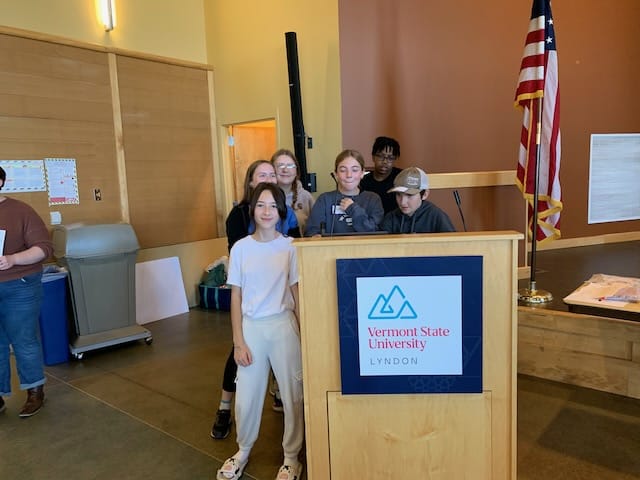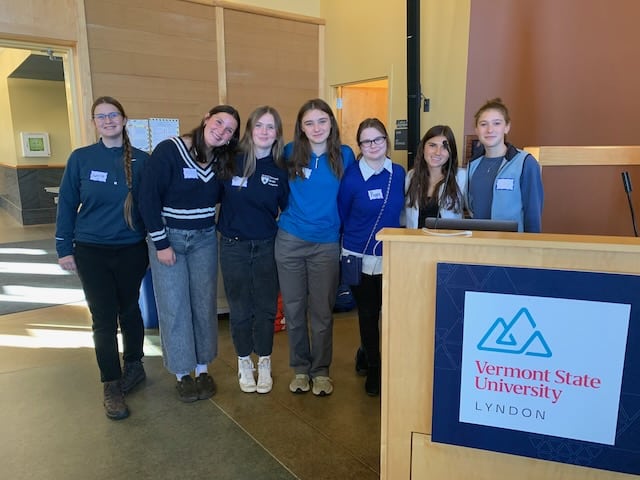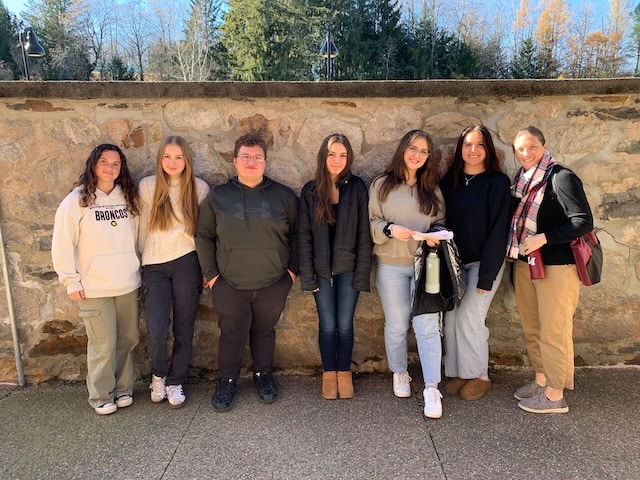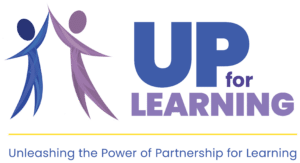
The Kingdom East School District’s 5th-8th grade students and teachers shared a powerful two days of building a deeper understanding of themselves as leaders and as members of overlapping communities. The student agenda derived from UP’s Cultivating Pathways to Sustainabilities (CPS) partnership program with Shelburne Farms, while the adult teams discussed ways to enhance project-based learning in their classrooms. Learning from teams from Lyndon Town School, St. Johnsbury Academy and Lyndon Institute, they concluded the days by listing hopes for their community which included being kind, helpful, successful, clean, trustworthy and fun while striving to promote gender equality, climate action, sustainable energy use, clean water, and world peace.
Kingdom East schools have been long-standing CPS partners. This year’s agenda grew from a successful day-long event last February where middle school teams shared their projects and learned more about sustainability from a CPS team at St. Johnsbury Academy. This year, the event expanded to have two tracks – one for adults and one for youth. While the adult staff discussed how to use the Global Goals as a foundation for Project Based Learning and how to more deeply integrate student-led projects into advisory and classrooms, the youth got a crash course in the UN Sustainable Development Goals (SDG) and their application to their everyday lives.
The Lyndon Town School (LTS) team (above photo) facilitated the introduction to the SDGs. They had attended the CPS kick off on October 21 where they first practiced the activities they led their peers in the next week. At the kick off, graciously hosted by Winooski School District, and also included teams from Winooski, Shelburne Community School, Main Street Middle School, and Rochester School, UP and program partners from Shelburne Farms led teams in community building, thinking and sharing about sustainability in their own lives and in their communities, and in familiarizing themselves with the UN SDGs. The Main Street Middle School team shared how they advocated for and designed a sustainability class that is now part of the specials rotation and how their program uses the SDGs and youth leadership to guide community based sustainability projects.
The LTS team spent three morning and some recess time putting together a slide show that explained each of the 17 SDGs in their own words. While some of the goals make sense, such as no hunger, the LTS team learned at the CPS kick off that some are less relevant to middle school students until it is put into the context of their own lives. For example, Goal 9 is Industry, Innovation and Infrastructure, which they described as “The goal of industry, innovation, and infrastructure is to build durable and strong infrastructure which is kind of like how all the roads got washed out from all the rain this year or the energy you use in your house but instead of using normal energy sources it could be using wind or solar power.”
After the group of six explained the goals, the St. Johnsbury Academy team (top below) held four workshops focused on sustainability and leadership. One asked students to imagine their “Perfect Community” and how sustainable practices support the ideal. Another was a Recycling Relay where each team had a bag of trash that needed to be divided between recycling, composting, and trash. The winner collected the most points from the correct sort. Two more centered on leadership – one was a challenge to move cups with rubber bands and another introduced the concept of “Explore, Develop, Grow, Empower” by thinking of leadership through a knot tying lesson and then using UP’s facilitator self-assessment to reflect on one’s leadership skills.
After the workshops, the multi-school group of over 75 students each day divided into five smaller groups to build a community web. Standing in a circle, each person offered a hope for their community before passing a ball of yarn to another member of the circle. This activity helped youth think of themselves as members of a school community, a district community, and a larger educational community.
After lunch and time with their school teams, they once again broke into smaller groups to attend workshops led by Lyndon Institute students. These teams (lower photo below) created short activities related to their own project-based learning. KESD students learned about Quality Education, Gender Equality, Affordable and Clean Energy and local electric charging stations, and Strategies for Combating Food Insecurity Locally. KESD students can attend Lyndon Institute or St. Johnsbury Academy; learning more about how their current school work connects to high school work made it seem relevant and important.
To wrap up the day held at VSU-Lyndon, another community connection point, the LTS team reviewed the SDGs, and this time they connected each goal to something presented during the day. For Goal #9, they highlighted how the teams traveled by bus on maintained roads rather than driving in separate vehicles. They asked each participant to answer three questions as an “exit ticket”: What two SDGs are most important to you? What are you passionate about changing in your community? What are you passionate about changing in the world? Together they created a vision for their community and a path for their individual and collective sustainability projects.
As a special conclusion, they sang and danced to “Let it Grow” from The Lorax movie.



